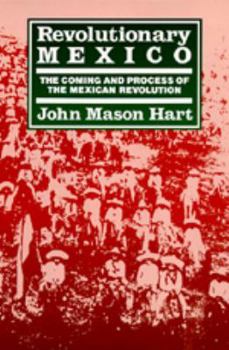Revolutionary Mexico: The Coming and Process of the Mexican Revolution, Tenth Anniversary Edition
Select Format
Select Condition 
Book Overview
This acclaimed reinterpretation of the Mexican Revolution, based on new evidence obtained in Mexican and American archives and on the historical literature of recent years, is available here in the... This description may be from another edition of this product.
Format:Paperback
Language:English
ISBN:0520067444
ISBN13:9780520067448
Release Date:August 1989
Publisher:University of California Press
Length:478 Pages
Weight:1.35 lbs.
Dimensions:1.3" x 6.0" x 8.9"
Customer Reviews
2 ratings
Very Interesting With Defects; 3.5 Stars
Published by Thriftbooks.com User , 16 years ago
This interesting book is a structural analysis of the Mexican Revolution of 1910-1920. In Hart's analysis, the Mexican Revolution was a crisis of modernization, or perhaps more precisely, a crisis of uneven modernization. The proximate outbreak of the Revolution was widespread dissatisfaction with the regime of Porfirio Diaz that dominated Mexico for the prior 35 years. The Diaz regime pursued policies of aggressive economic modernization by opening Mexico to foreign capital investment, particularly American investment, and increasing centralization of political power. The greatest share of benefits from these policies fell primarily to a relatively narrow sector of Mexicans associated with the Diaz regime. The Diaz era policies eroded the political and economic power of regional elites, impoverished traditional artisans, accelerated the destruction of traditional peasant/communal landholidings, expanded an impoverished and politically repressed industrial proleteriat, and alienated a growing Mexican middle class who were excluded from economic and political opportunities. Up to 1900, there was sufficient economic growth that dissent never reached a critical mass. After 1900, the social dislocations were magnified by Mexico's greatly increased involvement in the turbulent international economic environment of the early 20th century. A series of international and domestic economic crises provoked widespread unrest and ultimately destroyed the legitimacy of the regime. The ensuing Revolution, like most revolutions, became a civil war between shifting coalitions of the major groups - regional elites, industrial workers, rebellious peasant communities, and the emerging middle class - that overthrew the Diaz regime. Hart has a good analysis of the course of Revolution and how each of these groups attempted to achieve their objectives. Hart also deals with other important aspects of Revolution, such as the importance of ethnicity, particulary the role of Indian communities, and the pervasive effect of nationalism provoked by large scale American economic penetration of Mexico. Hart is particularly concerned with exposing the important role of American investment and the US government in both the outbreak and course of the Revolution. He devotes an impressive number of pages to detailed description and analysis of American investment and exploitation of Mexico. A great deal of this investment came from Texans who were powers in the American Democratic Party, including Woodrow Wilson's important advisor, EM House. The actions of American financial interests and the US government are described as crucial determinants of the outcome of the Revolutionary Civil War with Americans acting essentially a covert kingmakers by selective provision of armaments and financial support. Hart's assessment is supported by a great deal of original archival research. Hart has also an interesting chapter in which he places Mexico in international persp
good overview but scope too narrow
Published by Thriftbooks.com User , 18 years ago
Professor Hart's book was written in 1989, which isn't that long ago, but the book is showing its age in that it only looks at political actors and does not spend much time analyzing the underlying economic background to the revolution. He does have an intriguing chapter which shows the parallel revolutionary activity around the turn of the 20th century in Iran, China and Russia, as well as Mexico. Essentially, all these countries suffered from foreign control over capital availablity and resource extraction, facilitated by a complicit native oligarchy who maintained power through the rents obtained from selling off the resources to the highest bidders. That rent was then used to finance opulence instead of on the development of import substitution industries and agricultural and manufacturing sectors which would have provided jobs to the large underclasses. Coupled with a lack of democratic safeguards by which to manifest their discontent, the bourgeois classes united with the working classes to foment revolutionary violence in all these countries. Unfortunately, Hart spends too much time scapegoating US and European capitalists for making such inroads into Mexico's economy, instead of looking at how and why they were able to do so without much difficulty. Hart seems to follow the dependency theorist school, in which the late-industrializing countries are at the mercy of those which developed first, i.e. Britain, USA and France. This is not an incorrect assessment, but as more current research has shown in the work of such people as Doug North and Stephen Haber, this is not the whole story. Hart also updated this work in 2002 with a new volume entitled "Empire and Revolution," which generally goes over the same territory, but looks even deeper at the damned gringos who were behind all of Mexico's misery. While I am not in complete disagreement with such an assessment, it is an oversimplification of Mexico's revolution and it is why I think that Hart's books on the subject are not aging well.





